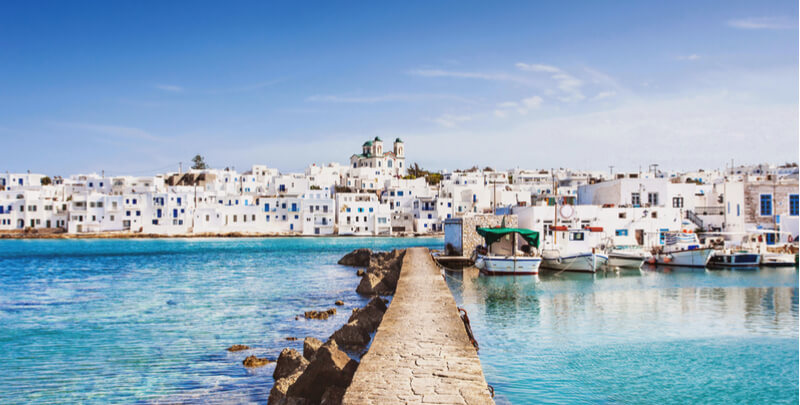How to open a Virgin Money Australia account. The steps, fees and requirements.
Looking for how to open a bank account with Virgin Money in Australia? We’ve got you covered. Here’s the process, fees and what you need to know.

Greece has plenty to offer the visitor - culture, climate, cuisine, and some of the friendliest people in the region. It’s no surprise that many people fall in love with the country and choose to settle for the longer term.
If you’re thinking of moving to Greece as an expat, you'll need a local bank account. Greek banks were subject to high levels of control during the height of the financial crisis in the country, making it tricky to open a new account and virtually impossible to get your hands on a credit card. However, the good news is that these restrictions are being loosened as the economy recovers, making it much easier to open your new Greek bank account.
There is no legal restriction on offering financial products to non-residents, although each bank will decide which accounts it makes available. One thing you'll need, however, is a local tax number, called an AFM (Arithmo Forologiko Mitro). To get your hands on this, you’ll need to visit a tax office in Greece and submit an application and provide supporting documents.¹
To open a Greek bank account you'll need to submit an application with supporting documents, and also, usually, pay a minimum deposit into the account.¹
Many banks will allow you to start to complete the application process online, or by giving someone local the power of attorney to do so for you. However, in all cases, before your account will be fully activated, you'll need to visit the bank personally². This can add some time to the process, as you'll usually need an appointment. Check the specific requirements of your chosen bank branch before you visit.
Anyone opening a bank account in Greece - even locals - will need a hefty amount of paperwork to assure the bank they’re creditworthy. As a foreigner, you might need to have documents translated or notarised, which can add to the expense and complexity. Some banks, however, will accept documents in English as well as Greek. Check out exactly what your bank needs with plenty of time to spare.
To complete the process of opening your bank account, you must visit a bank in person, and take along your passport¹. This is because banks require signature samples, and meet with all new account holders to take any additional information.¹
That said, you can complete the vast majority of the process online. After you’ve done that you just need to call your local bank branch when you arrive in Greece, to finish up your application and activate your account.
When you choose which bank to use, you’ll need to know what fees will be applied to the transactions you make. Although there won’t usually be an administration fee to open an account¹, every bank will have charges for some services, such as withdrawing cash from an ATM or making international transfers. Even if these look pretty small, they can add up quickly.
You’ll find that many Greek banks levy charges if you withdraw cash from an ATM which isn't in their network. Each bank will set its own fees, so it’s a good idea to check the terms of the account you’re planning to open. As many of the banks operating in Greece also have branches or subsidiaries in the region outside of Greece, you might find that you can benefit from reduced charges by using ATMs in your network while you travel, too.
Despite this, if you’re using your Greek card abroad, or you choose to use your home bank card in Greece, be wary of the fees you can incur. It’s especially important to avoid excess charges applied due to dynamic currency conversion (DCC).
Before you choose a bank account, you must read the small print about account fees. Some accounts come with regular fees for administering the account. Others will levy a charge for holding a debit card against the account, or insist on a minimum balance which you must maintain. Some accounts come with opening offers which will reduce or waive fees. Each account is different, but because banks offer a wide range of products, you should be able to find something to suit you without too much trouble.
As an expat in Greece, you'll likely find that you need to transfer money to your Greek bank account from abroad - or vice versa. While this is simple enough to do, there will be fees involved. Often your home bank won't offer the best deal when it comes to international money transfers. Banks usually add an administration fee, which may not be transparent, and also use poor exchange rates. Instead of using the real, mid-market rate, banks will add a markup and pocket the difference.
You might find that you can get a cheaper - and quicker - international money transfer by using a specialist service like Wise. Unlike many traditional banks, Wise use the mid-market rate for international transfers, and add only a small, transparent fee. Find out more about the mid-market rate, and check how fair your bank’s offer really is.
Greece has a large banking sector, with many local brands operating all over the Southeast European region. There are also some international banking brands which work in Greece and have branches in the large cities and tourist areas, including HSBC and ProCredit Bank. However, many global banks pulled out of Greece during the financial crisis and have yet to return.
The largest banks in Greece are:
Piraeus Bank operates throughout the Southeastern Europe region, with 597 branches in Greece, and more throughout the rest of the region³. Piraeus operate other brand names elsewhere in the area, so if you’re travelling it’s worth understanding what their local brand is in the area you’re going to.
Helpful products they offer:
Alpha Bank is the second largest in Greece, and as you might expect, they offer a great range of products. You’ll find bank accounts for checking and savings, as well as cards and loans for all purposes. Alpha operates throughout the region, with 481 branches in Greece, and nearly 200⁴ in other countries covering countries including Albania, Serbia, Romania and Cyprus.
Helpful products they offer:
Another of the largest Greek banks, with a presence domestically and in the Southeast European region. You'll find 878 branches⁵ through the area, and products aimed at personal and business customers.
Helpful products they offer:
Eurobank operates in seven countries and is the third largest bank in Greece⁶. The products on offer are aimed at both corporate and private customers and the website and online banking can be accessed in English.
Helpful products they offer:
Another great option for expats, freelancers working with businesses based overseas, and those who travel regularly, is a Borderless account from Wise. With a Borderless multi-currency account, you can hold your money in more than 40 different currencies, including EUR, USD, AUD and GBP. You'll also be able to get your hands on a debit card to make accessing - and spending - your money easy.
There are no monthly account fees, and you can move the money you have in your account between currencies using the mid-market rate, and with only a small fee. Because you get local bank account details which can be used in the eurozone, the US, Australia and the UK, you can bank like a local wherever in the world you are.
Learning about the banking system in a new country can be a little daunting, but you shouldn't have any problem getting set up in Greece with a local or Borderless account. And once you have your euro bank account, you’ll find it much easier to do things like set up local services - phone, internet and cable. Even better, it’ll be much cheaper for day to day transactions, so you can get on with enjoying your new life in Greece.
Note: Capital controls are currently imposed on all Greek bank accounts. This may affect how much you can spend and send. You can find more information about this here: https://www.reuters.com/article/us-eurozone-greece/greece-to-ease-capital-controls-raises-monthly-cash-withdrawal-limit-idUSKCN1IW1JA
Sources:
This publication is provided for general information purposes only and is not intended to cover every aspect of the topics with which it deals. It is not intended to amount to advice on which you should rely. You must obtain professional or specialist advice before taking, or refraining from, any action on the basis of the content in this publication. The information in this publication does not constitute legal, tax or other professional advice from TransferWise Limited or its affiliates. Prior results do not guarantee a similar outcome. We make no representations, warranties or guarantees, whether express or implied, that the content in the publication is accurate, complete or up to date.
*Please see terms of use and product availability for your region or visit Wise fees and pricing for the most up to date pricing and fee information.
This publication is provided for general information purposes and does not constitute legal, tax or other professional advice from Wise Payments Limited or its subsidiaries and its affiliates, and it is not intended as a substitute for obtaining advice from a financial advisor or any other professional.
We make no representations, warranties or guarantees, whether expressed or implied, that the content in the publication is accurate, complete or up to date.

Looking for how to open a bank account with Virgin Money in Australia? We’ve got you covered. Here’s the process, fees and what you need to know.

Learn how to close your Revolut Australia account. The steps, options and important need-to-knows before your begin.

If you’re a student juggling study alongside work and social commitments, ensuring you have reliable and easy access to your money is essential. Choosing a...

Coming into student life something you might not think to address straight away is your banking. Many Australian banks offer accounts designed for students,...

Depending on the bank, student bank accounts might have extra features or slightly better conditions for those studying, when compared to a standard account....

Here’s how to close your ME Bank account and options to move your money out correctly